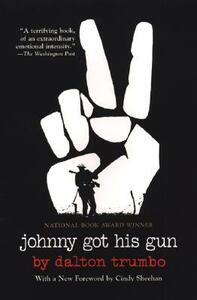You need to sign in or sign up before continuing.
Take a photo of a barcode or cover
A shocking book, beautiful in its own way, life and death described marvelously in these pages. A bit rough with straightforward ideas, simple and truthful, with a great writing style and a quick, yet fascinating plot. I really loved it, totally recommend it!
challenging
dark
mysterious
sad
slow-paced
Plot or Character Driven:
Character
Strong character development:
Yes
Loveable characters:
Yes
Diverse cast of characters:
No
Flaws of characters a main focus:
Yes
Johnny Got His Gun is a war story, an atypical anti-war novel about the result of a young man going off to war in 1918. It is unflinching and devastating.
Taking place within the mind of our narrator Joe Bonham we get flashbacks to his pre war self, brief glimpses at combat, and most of all we get the stream-of-consciousness thoughts of a man trapped inside a prison that war created.
It’s a moving novel that will leave you thinking long after you finish it. It will make you reconsider notions such as liberty, freedom, decency, patriotism, and democracy. It’s a powerful novel that does one of the most powerful things a novel can do. It makes you re-examine your beliefs.
Taking place within the mind of our narrator Joe Bonham we get flashbacks to his pre war self, brief glimpses at combat, and most of all we get the stream-of-consciousness thoughts of a man trapped inside a prison that war created.
It’s a moving novel that will leave you thinking long after you finish it. It will make you reconsider notions such as liberty, freedom, decency, patriotism, and democracy. It’s a powerful novel that does one of the most powerful things a novel can do. It makes you re-examine your beliefs.
dark
emotional
inspiring
reflective
sad
tense
medium-paced
Plot or Character Driven:
Character
Strong character development:
Yes
Loveable characters:
Yes
Diverse cast of characters:
No
Flaws of characters a main focus:
No
challenging
dark
emotional
sad
tense
slow-paced
Plot or Character Driven:
Character
Strong character development:
Complicated
Loveable characters:
Complicated
Diverse cast of characters:
No
Flaws of characters a main focus:
Yes
"Johnny Got His Gun" by Dalton Trumbo is a profoundly moving and thought-provoking novel that left a lasting impact on me. As someone with family members who fought in the Vietnam War and hearing their stories of grappling with the lasting effects of PTSD, this book resonated deeply with me. It served as a stark reminder of the toll that war takes on individuals and their families.
This book offers a unique and compelling perspective, allowing readers, especially those with military backgrounds like me, to consider the profound human cost of war. Trumbo's storytelling is both haunting and eye-opening, making us confront the harsh realities that too often remain hidden behind the curtains of conflict.
One of the most striking moments in the book comes from the forward by Roy Kovich, where Trumbo autographs Kovich's wheelchair with the powerful words: "Nothing more can be said—it can only be done." This sentiment captures the essence of the book, where words alone cannot convey the true magnitude of the experience; it must be felt and understood on a deeper level.
I wholeheartedly recommend "Johnny Got His Gun" to readers of all ages, especially students in middle school or high school. It's an essential work that encourages empathy and understanding while reminding us of the profound impact of war.
In summary, "Johnny Got His Gun" is a poignant and essential read that speaks to the lasting impact of war on individuals and society. It's a book that will stay with you, urging reflection on the human cost of armed conflict.
This book is on several different "most disturbing novels" lists so I had to read it. For being written in the 1930's it would have definitely been exceptionally disturbing, at least for American culture in that time. As far as it still landing on "most disturbing novels" lists today right beside works by the likes of De Sade, I don't think this novel is a great fit. I do think it is a great book however, albeit with a few problems. It can be nauseatingly syrupy, mawkish, and melodramatic in addition to having such a strong anti war message that it often feels more like a soap box for the author. It can be quite moving and intense but it can also feel a little cheap, exploitative, and a bit like "misery porn." Alongside the horrors of war it depicts extreme human suffering juxtaposed with societal or at least institutional apathy often to great effect. I think this is certainly worth reading and it is unforgettable but it's more like a violently graphic public service announcement than it is a piece of literature. It's sort of like an ad against drunk driving that shows an unusually horrifying car accident meant to scare teenagers except it is about war showcasing an unusually horrifying injury combined with a neglectful hospital system. It's essentially about a man who descends into a living hell on earth but written in a lecturing tone that doesn't feel entirely organic.
Graphic and visceral, this book can't help but make an impression on the reader.
I don't agree 100% with the premise of the book - sometimes countries and societies don't ask for the conflicts they are thrown into. Not the general population, at least. Maybe the elimination of the draft in the US has blunted the message slightly; the uninvited and aggressive nature of other wars, too. How then, should they feel about wars? Attack the people who put them there in the first place? Give up and move on - make the best of a bad situation?
I'm sure if you asked a Vietnamese person in 1957 if they thought they were less free than someone from France or England or the US they would say, "yes, that's the whole point of this revolution." If you asked a US veteran today about the 2nd Iraq war then you would probably find more adherence to the thesis of the book. Military isolationism works to a point, but eventually the world comes to you regardless of where and how you live.
War is bad - I don't think you'll find a sane and well-adjusted person on earth who disagrees. That doesn't mean insane or maladjusted people don't exist. The book is for them, then. Look at the spot you put others in, while thinking you are above it. You don't care what happens to others, as long as you make it out on top. Why?
I don't agree 100% with the premise of the book - sometimes countries and societies don't ask for the conflicts they are thrown into. Not the general population, at least. Maybe the elimination of the draft in the US has blunted the message slightly; the uninvited and aggressive nature of other wars, too. How then, should they feel about wars? Attack the people who put them there in the first place? Give up and move on - make the best of a bad situation?
I'm sure if you asked a Vietnamese person in 1957 if they thought they were less free than someone from France or England or the US they would say, "yes, that's the whole point of this revolution." If you asked a US veteran today about the 2nd Iraq war then you would probably find more adherence to the thesis of the book. Military isolationism works to a point, but eventually the world comes to you regardless of where and how you live.
War is bad - I don't think you'll find a sane and well-adjusted person on earth who disagrees. That doesn't mean insane or maladjusted people don't exist. The book is for them, then. Look at the spot you put others in, while thinking you are above it. You don't care what happens to others, as long as you make it out on top. Why?
Very difficult to read painful but ultimately very valuable. Wish I had read this before I joined the military because I would have had a different position
slow-paced
I enjoyed the beginning as the idea was fascinating but after that, it was dull, boring and repetitive until the last three chapters. The narrator tended to meander on tangents that felt irrelevant and did not push the plot further. Perhaps it was used to add life to the main character but I just found it dreadfully boring. The last three chapters returned some of my liking for the book but that does not compensate for the slog of the middle.





